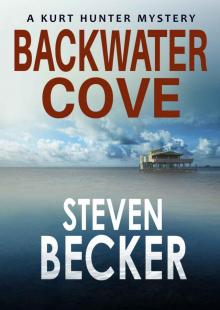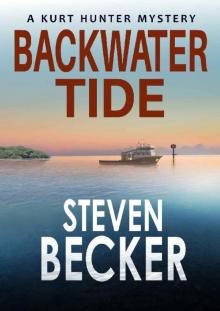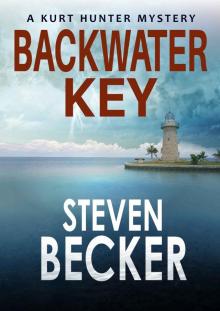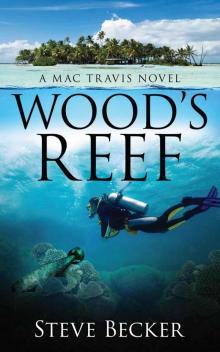- Home
- Steven Becker
Wood's Wreck Page 4
Wood's Wreck Read online
Page 4
“You care to explain that to the Federales?” Mac asked her as he coasted up to the dock. Two officers came toward the boat to help with the lines. Once it was tied off, Mac went to disembark.
“Hold on there.” One of the men stepped forward, hand on his holster.
“You can take your hand off the gun. No reason for that,” Mac said.
“The three of you go stand against the port side there.” The officer hopped onto the deck and signaled for one of the other men to watch them. “I need to search this vessel. Who’s the captain?”
Mac stepped forward and stopped when the officer nearest to them drew his weapon. “I told you that’s not necessary. My name’s Mac Travis. It’s my boat, and I have a commercial license. I’m guessing you have some kind of just cause or something to come onto my property.”
“Holster that weapon, deputy,” another man said. “Fish and Game has the authority to search any vessel in our jurisdiction at any time. If you’re a commercial fisherman, you ought to know that.” He went toward the cabin. “Now let’s have a look at your papers.”
Mac moved toward the man while the other two officers boarded the boat. The deck was crowded now, as the men started their search. He went into the cabin and opened the chart table with one eye on the deck.
“Here.” He grabbed a stack of papers and handed them to the officer. “Permits, registration, it’s all there and current.” Telling the truth, or at least what he knew of it, was probably the easiest way out of this. He knew he was in trouble, and probably big trouble. The least he could face was a fine, that he would of course have to front that for Trufante who was always broke, The worst was the loss of his commercial license and maybe his boat, which would put him out of work. Add that to the loss of the cache on the reef and things were looking bad. How he handled this could be the difference. “I’ll tell you right now that my mate there—” He pointed to Trufante. “—Took that woman out, and they’re over the limit. Lobsters are in there.” He motioned to the fish box just before the deputy lifted the lid.
They left the cabin and joined the gathering of people staring into the fish box filled with lobster. “Go ahead and start with these. You know the drill; check the size and get a count,” the officer said. He looked up at another deputy. “And keep looking.” Then he turned to Mac. “What’re you doing aboard if you weren’t with them?”
Mac pointed to the paddleboard. “I was out fishing when they cruised past. Just got a ride back, is all.”
“Hate to break it to you, but it’s your license and your vessel. Doesn’t matter who’s on board and who’s not,” the officer said.
Mac looked at Trufante and shook his head, wondering how bad this was going to get. He sat down on the gunwale and watched as the lobsters were pulled one at a time from the fish box. They were stacked in two piles; one of legal size, the other with shorts. He was starting to calculate the fine in his head when the head man came over to him.
“Mr. Travis, my boss is coming over here with some papers and some bad news for you. I’m going to do you a favor and tell you what we know and let you call a lawyer, if you want.”
Mac nodded.
“We had a boat out by the Sawyer Keys pulling casitas. It’s pretty high on our priorities to eradicate all those illegal habitats out there.”
Casitas, Mac thought. That’s what this is about. He had seen a chart in the Deptartment of Fish and Game newsletter showing how the the illegal traps were heavily concentrated in that area. That had to be how Trufante had gotten this many lobster.
The man continued, “This boat was working an area we were about to hit, so we sent an inflatable out to see what was going on. Your man here pulled out before we could get there and hightailed it through the backcountry. We have orders not to pursue out of sight of the base boat, so the inflatable didn’t follow.”
Mac looked over at Trufante again. He didn’t look worried at all, sitting there playing grab ass with the redhead. “You hear what he’s saying, Tru?”
Trufante looked up. “Yeah. That’s about it. Sorry, Mac.”
“In a marine sanctuary on top of it. Now the feds are involved.”
“Sorry,” Trufante muttered again.
“Sorry.” He was at a loss for words. This could cost him his boat. NOAA was becoming increasingly involved in both the removal of the casitas and the prosecution of those involved. The federal agency started using the laws of civil forfeiture to confiscate property in these cases. As the chart in the newsletter had shown, the largest concentration of casitas were in and around marine sanctuaries. He and the other commercial fishermen steered clear of the protected areas and he knew there was a good probability that a NOAA boat had been working the Sawyers Keys area when Trufante was there. He turned to the officer. “I don’t have my phone on me. Can I go in the house and make a call?”
“You’re good until my boss gets here,” the man said, and turned his attention to the lobster crawling around the deck.
Mac jumped onto the dock and strode to the house. He went up the back stairs, opened the sliding glass door to his bedroom, and made his way to the kitchen, where he yanked the phone from its charging cord and checked the screen for messages. It was blank.
He opened the phone app and hit Mel’s number. Pacing the room while the phone rang, he wondered how she was going to take this.
She answered on the fourth ring. “Where are you?” he asked.
“I’m fine thanks, how are you?”
“Sorry. I got trouble here at the house. Fish and Game and some suits. Trufante took the boat …”
She cut him off, her tone changing entirely. “Stall them for ten minutes. I’m just getting off the Seven Mile Bridge. Don’t say anything to anyone and keep that stupid Cajun quiet.”
Mac put the phone in his pocket, pulled the charger from the wall, and went back to the bedroom. Mel was good—very good—but this kind of law was a little out of her wheelhouse. He feared what was about to happen. Casitas were the bane of legitimate lobster men. Instead of the approved traps, which allowed undersized lobsters to escape, these unmarked and illegal devices could hold hundreds of lobster in one spot, without regard to size.
They were the tools of poachers, and known to be out of bounds.
There had been several cases lately where offenders accused of poaching had lost their boats, houses, and vehicles. Most fishermen didn’t have the capital or concern to set up a corporation to protect themselves and their assets, so if the law came after them, that was the end. After deciding he had everything he needed, he went downstairs through the workshop and into the office. From the desk he grabbed a handheld GPS, then went to the safe and unlocked it.
He heard someone try the rollup door and quickly grabbed the felt bag with the last of his gold and a thumb drive and shoved them in his pocket. The safe closed, he turned to see two men and a woman standing in the doorway. One was the officer from the boat; the other was dressed in a suit, his brow sweating, clearly uncomfortable in the humidity.
“We’ll take the GPS. Could be evidence on there,” One of the men said.
Mac handed him the unit and turned to the woman—the local sheriff, whom he knew well. “Jules, can you tell me what’s going on here?”
“I heard some stuff on the radio and figured I’d come and see if I could buffer this a little. It’s got nothing to do with the sheriff’s office, but I’m here to vouch for you, or do whatever I can,” she said, her tone somber.
Before he could thank her, the man in the suit handed him a stack of documents. “I’m Bill Harris, district attorney for Monroe County, and I’m here to personally serve these papers and confiscate the property indicated.”
This was happening way too fast. Mac took the papers and scanned them. One named his boat and the other the house. They were charging him with poaching in the marine sanctuary and trying to take everything he had. He tried to hide his anxiety and took his time reading them, hoping that Mel would barge in at any s
econd and help him.
“Jules,” he looked up. “Can’t you help with this?” He hoped his long time friend could help him out.
“Sorry, Mac. I checked that they dotted their I’s and crossed their T’s, but that’s all I can do.”
The group turned as the front door opened and Mel burst through.
“Jules, thank God. Can you tell me what these idiots are into now?” She went to Mac and grabbed the papers from his hand, leaned against the desk, and started reading.
“You better hear it from them. I’m just here to give some moral support and make sure they follow procedure. If they’re going to arrest him, I can try and take him in here and get bail set. Otherwise they might take him to Miami and put him in a Federal prison. It’ll be a lot harder to get him out then.”
She looked up from the papers. “It’s the boat and the house, Mac. Casitas, really. I’d figure Tru for that, but not you.”
Mac looked at her. “I have nothing to do with this. There’s some redheaded bimbo out there that suckered Trufante into this.”
She didn’t wait to hear more, and stormed out of the room, heading for the open back door and the dock. Mac followed the group outside wondering how this was going to play out. But, before she reached the dock she stopped and was about to turn towards the lead agent but did a double take and stared at the boat for a long second before facing the agent.
“So this happens now?”
“Yes, ma’am, I have the authority to take the boat and lock the house. Both items will be held. If he’s found guilty, they will be auctioned off.”
From the way the conversation was going, Mac figured there was nothing she could do … at least now. If there had even been a tiny crack in the legal veneer or paperwork she would have pried it apart.
“It is what it is. I think she’ll have to take you three into custody.” He looked at Jules.
“He’s right, Mac. I have a car on the way for those two on the boat.” She looked toward the dock. “You can ride with me. I’ll make sure you can get bail tonight.”
He looked at Mel hoping she would have his back.
“Yeah, I won’t leave you hanging. Let me just grab a few things before they lock us out,” she said.
He looked after her as she headed upstairs.
Mac stood helpless his fingers deep in his pockets, protecting his last assets. The small amount of gold would not get him far, but the information on the thumb drive might.
Chapter 6
Mel stared at the ceiling, exhausted, trying to count the dots on the acoustic tiles. She had run out of things to do or even think about an hour ago. It was close to nine, according to the clock on the wall, and she had been waiting for hours. The first few hours had been hectic; nonstop phone work to try and make a deal. First she had pulled some strings to keep Mac in Marathon with the local authorities, instead of him being transported to Miami and held in Federal prison. Then she had negotiated his release and obtained a bail bond. Not the kind of work she was used to doing, but she had called in several favors and finally gotten it done. Jules had come out and reassured her a while ago that things were moving forward and Mac should be released soon.
The time had given her an opportunity to think and plan. She had seen the red-head on the boat, her boss, Cayenne. She had to be behind this and Trufante was a pawn in her game. She believed Mac was innocent. The challenge was that it was his boat. The Feds had already confiscated the boat and moved it to a marina on the Gulf side. The house was an even larger issue. The court order allowed the house to be locked as a crime scene and if Mac was indicted, and proven guilty, it could be auctioned under the civil forfeiture act.
She had little time to fight to save both assets, and needed an immediate solution—like where to sleep tonight. The battery on her phone had gone dead, so she had nothing to do but think and count little dots on the ceiling.
Her thoughts were troubling. Yes, she loved Mac, but there was seldom a lull in his adventures … or, better stated, the misadventures of Alan Trufante, which Mac always got tangled up in. Sooner or later—and with Trufante’s luck it would be sooner—something really bad was going to happen. And this might be it. Without the boat, Mac had no way to make money. With that and the loss of his cache on the reef, she suspected he was near broke. If he lost the boat and the house, he would have to start from scratch.
She was less worried about herself; with a law degree and her experience, she could find work. There was always opportunity in DC. Her count was interrupted—just as she started to think about Cayenne and her involvement—by the door opening.
Mac walked out, head held low, and she immediately got out of the chair and went to him. Together they walked out of the building and to the truck. They got in and Mel pulled out of the parking lot and onto US1.
“Where do we go?”
“Mel,” he stuttered. “I’m so sorry about all this.”
She punched his arm. “I know it was the lame-brain Cajun. The only thing I’m mad about is that you still hang out with him. Why’d you let him take the boat?” She figured berating him would serve no purpose now.
“He was supposed to go get the windlass fixed. Broke it last week and it was his fault. I didn’t see any harm in that until I saw him flying through Sisters Creek with that redheaded bimbo. It’s really hard to find help here.”
“That redheaded bimbo, huh?” Mel said as they pulled into a strip center parking lot with a barbecue restaurant on the end.
Mac got out of the truck and went to the door. He held it open for Mel to enter and the conversation was put on hold as they ordered food and sat down.
“We need a plan.” Mel said. “They impounded the boat and locked up the house.”
“I don’t know. Maybe the best thing for me is to go out to your dad’s place and figure this out. Humanity is rubbing me the wrong way right about now.” He noticed her look. “I was talking about us going out there,” he corrected himself.
Her look remained unchanged. “That’s not what I was thinking about. I know you have no issue running from your problems, but this needs to be handled, and quickly. The faster we can figure this out, the better chance you have of walking away unscathed.”
Their food came and they started to eat.
“What do you mean figure this out?” Mac asked as he set a stripped rib bone down and wiped his hands.
Mel took a bite of her sandwich, “The Feds are not going to solve this. The burden is on you to prove that you’re innocent. They think they’ve already done their job catching you and confiscating your property. There’s probably some high-level backslapping going on right now at your expense.” She stopped and finished eating.
“Here’s what I’ve been thinking about. You want to find a boat and go out to my dad’s for a while, and that could work. I ought to give you a bunch of crap about running away, but I’ll save that. From his place, you can scout out the area and see who owns those casitas. Find out what’s really been going on out there.”
“And it doesn’t sound like you’re coming with me.”
She looked at him with as much empathy as she could. “Mac, I can help more from Key West. The legal system is my tool.” She finished the last french fry and pushed her plate away. “What about a boat? How are you going to get out there?”
“I can take a board and paddle out. Your dad’s skiff is still there, and I’ve been meaning to have a look at that boat that’s wrecked on the beach.”
“Figured you had a plan. You good if I take the truck?”
“Better you than the Feds.”
***
Mac watched as Mel pulled out of the driveway and waved to him. He walked to the front door and tugged on the lock placed there by the authorities. A bright yellow notice stated that the house had been confiscated and could be auctioned at a to-be-announced date. He felt like tearing it off, but thought better of it. Around the side of the house, he found the neglected kayak leaning against the stucco and pushed i
t over. It was an old sit-on-top, and hadn’t been used in several years, since he had discovered paddleboards. But his best board had been on the boat when the Feds took it, and if he were going to make the passage to Wood’s Island at night, the kayak was the safer vessel.
Spiders crawled frantically from the shell as he pulled it to the seawall and went back for the paddle and his backpack. The night was dark and he knew the moon, though it would be near full, wouldn’t rise for several hours. An unlit boat at night was dangerous and illegal. A light would be essential for the trip, especially as he had to pass under the Seven Mile Bridge on his way to the Gulf side. Even at this time of night, there would be anglers and boat traffic. Without a light, the kayak sitting low in the water would be invisible to passing traffic.
He walked around the house, looking for anything that could illuminate the kayak enough to warn boaters, but found nothing. About to give up, he dug in his pocket and retrieved his phone. It would wear down the battery—if it even made it the entire three hours he expected the paddle would take—but the camera flash would put off enough light. The problem now was keeping it dry. The motion sensor detected his movement and he looked up at the lights on the back porch, which came on when he walked past. Each light was surrounded by a glass globe in the shape of a jelly jar. If he could seal the bottom, the globe would protect the phone. He climbed the stairs and retrieved one, juggling the hot glass from hand to hand as he descended.
He dragged the kayak to the edge of the seawall, then took the phone and placed it inside the globe and started looking for a way to seal the open end. The plastic kayak had several drink holders molded into it and he stuck the globe into one. Happy with the fit, he placed the phone in the jar, reset it in the holder, and dragged the boat to the edge of the seawall.
He needed to get out of there quickly, before someone reported seeing him, and the light was a sure giveaway. So he pushed the front end of the boat over the wall and into the water four feet below. Careful not to lose control, he leaned down and then got on his belly with his arms extended to the water to place the stern in. The kayak bobbed in the light chop as he eased his body over the seawall, using the wall to brace the unstable craft until he could sit.

 Backwater Cove
Backwater Cove Storm Surge: A Fast Paced International Adventure Thriller (Storm Thriller Series Book 3)
Storm Surge: A Fast Paced International Adventure Thriller (Storm Thriller Series Book 3) Backwater Tide
Backwater Tide Backwater Pass
Backwater Pass Backwater Flats
Backwater Flats Wood's Revenge
Wood's Revenge Haitian Gold
Haitian Gold Backwater Key
Backwater Key Wood's Tempest
Wood's Tempest Uncharted Waters
Uncharted Waters Tuna Tango
Tuna Tango The Wreck of the Ten Sail
The Wreck of the Ten Sail Backwater Bay (Kurt Hunter Mysteries Book 1)
Backwater Bay (Kurt Hunter Mysteries Book 1) Storm Clouds
Storm Clouds Wood's Wall
Wood's Wall Wood's Reach
Wood's Reach Wood's Fury
Wood's Fury Storm Rising
Storm Rising Bonefish Blues
Bonefish Blues Wood's Harbor: Action & Sea Adventure in the Florida Keys (Mac Travis Adventures Book 5)
Wood's Harbor: Action & Sea Adventure in the Florida Keys (Mac Travis Adventures Book 5) Wood's Reach: Action & Sea Adventure in the Florida Keys (Mac Travis Adventures Book 6)
Wood's Reach: Action & Sea Adventure in the Florida Keys (Mac Travis Adventures Book 6) Wood's Wreck
Wood's Wreck Wood's Harbor
Wood's Harbor Wood's Reef
Wood's Reef Backwater Bay
Backwater Bay